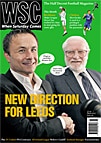 A hundred years ago it was the Manchester United players who were the outcasts. As the PFA celebrate their centenary, John Harding looks at all those who helped make the players’ union
A hundred years ago it was the Manchester United players who were the outcasts. As the PFA celebrate their centenary, John Harding looks at all those who helped make the players’ union
In December 1907 a group of professionals from the two Manchester clubs, Preston North End, Sheffield United, Bradford City, West Bromwich Albion, Newcastle United, Tottenham and Notts County gathered in the Imperial Hotel opposite Manchester’s Piccadilly Station to launch the Association Football Players’ Union.
Stars there included England centre-half Charlie Roberts, whose shaved head, chunky good-looks and daringly tight shorts had already set many a Lancashire mill girl’s clogs a-clattering, and Welsh Wizard Billy Meredith, football’s bad boy, whose toothpick dangling nonchalantly from a corner of his mouth and shirt collar turned up à la Eric Cantona had made him the idol of every pot-boy and articled clerk thronging the Old Trafford terraces.
The players were also the darlings of the popular press: when the Manchester United team found themselves famously “locked out” by the club a year later in the desperate fight to keep the fledgling union alive, press photographers flocked to their impromptu training ground at Fallowfield and snapped the now iconic “Outcasts” team group of 1909. The FA were forced to concede and the AFPU survived to become the first sporting union in the world.
The hotel is long gone, but the city’s grand Victorian town hall still stands and it was there last month that the PFA, successors to the AFPU, announced their impressive centenary plans. It might have been an occasion for some triumphalism as the PFA are now a well established, powerful institution in the world’s richest football nation. But chief executive Gordon Taylor’s address to the press struck a decidedly earnest, even sober note. As he stressed the organisation’s grassroots role, its work in deprived communities, in building bridges with proactive anti-racism policies, there was a sense that he and his organisation were intent on using the centenary to showcase what the PFA feel they do best. In effect, to counter the calumny that they are simply the mouthpiece of millionaires.
To that end, at the heart of the centenary year will be the One Goal, One Million campaign, aiming to raise £1 million for a new rehabilitation and physiotherapy unit at the University Children’s Hospital, Manchester. Taylor was able to announce that £250,000 had already been pledged by players. Given the roster of upcoming events, raising the rest should prove no problem. These include a pro-celebrity golf day, two race days, a nationwide “keepy-uppy” competition for youngsters, even a PFA record.
The year culminates in a Legends match at the City of Manchester Stadium on December 2, the exact day the PFA were formed. An England XI, managed by Terry Venables and captained by Alan Shearer, will take on a World XI skippered by Gianfranco Zola and coached by Jürgen Klinsmann. A banquet that evening for 2,000 guests at the G‑Mex will top it all off.
Pride of place at the launch went to some of the children, grandchildren and even great-grandchildren of the founders as well as to distinguished elder activists such as Bobby Charlton and Tom Finney. Fittingly, too, George Eastham, the England, Newcastle and Arsenal star of the 1960s, had flown in from South Africa. It was his historic stand at the High Court in 1963 that began the slow, inexorable unravelling of the hated retain-and-transfer system, a key moment in union history.
A photo on display at the launch showed Eastham and the then union secretary Cliff Lloyd striding manfully along the pavement outside the Law Courts before the hearing. Their bland expressions concealed genuine emotional terror at the ordeals to come within. Eastham admitted to Gary Newbon: “The case was absolutely terrifying, having to stand in front of the Newcastle chairman, who was a criminal lawyer. After I finished being interviewed by him, I felt like a criminal. Fortunately, Mr Wilberforce, the judge, felt the other way.” Eastham could have walked away from the ordeal, having already obtained his transfer from Newcastle to Highbury, but he pressed on, knowing that the cash-strapped union had all but bankrupted itself in supporting him.
On a lighter note, another legendary ex-member Roger Hunt revealed that, during Jimmy Hill’s campaign to smash the maximum wage in 1961, the Anfield hierarchy had laid on two buses to take the whole Liverpool team to a key union meeting. Hunt admitted: “There was one proviso – that we voted against. Needless to say, we all finished up voting for.”
From WSC 241 March 2007. What was happening this month